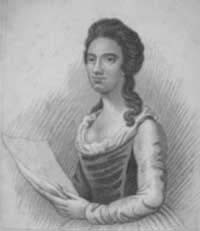 |
| unknown author, Public domain, via Wikimedia Commons |
For some reason Anne Steele inherited the Bible of Anne Dutton née Williams (1692?–1765). Dutton, a writer and theologian, was born in Northampton, probably in 1692. She contributed, through her writings, to the ongoing Evangelical Revival of the 18th Century and was a controversial defender of Calvinistic Baptist theology.
Through her parents’ generosity, she obtained a religious education. The family attended the Independent church at Castle Hill, Northampton, pastored by John Hunt (1698–1709). Under Hunt’s pastoral care, Dutton experienced conversion about 13 and when she was 15 became a church member. When Hunt died, he was succeeded by Thomas Tingey (d 1729). Dissatisfied with Tingey, Dutton moved to the Baptist congregation in Northampton pastored by John Moore (1662-1726), where she was baptised. Under Moore’s preaching, she matured spiritually.
In 1714, aged 22, she married a man called Thomas Cattel, of whom little is known. A year later, she and her husband moved from Northampton, to London. There the couple attended the Baptist church in Cripplegate, pastored by hyper-Calvinist John Skepp (d 1721), who served the church from 1715 until his death. When Anne’s husband died in 1720, she moved back to Northampton. The following year, she married Benjamin Dutton (1691/92–1747), a Baptist preacher, who in 1732 became the pastor of the Baptist congregation in Great Gransden, Huntingdonshire. This church grew under Dutton's ministry. The church’s growth meant they needed to construct a new worship place and manse in 1743. On August 17 of that same year, Benjamin travelled to America, either to raise funds for ministry or to promote his wife’s published works, or both. His trip was successful but on his return in 1747, the ship sank; he drowned at the age of 56. Anne, who never had children of her own, remained a widow the rest of her life. She stayed in the Great Gransden congregation, spending much of her time writing theological treatises, poems, hymns and letters. She corresponded with two key leaders of the Evangelical Revival: John Wesley (1703–1791) and George Whitefield (1714–1770). As a Calvinist, she supported Whitefield and critiqued Wesley. Through ink, she challenged Wesley’s views on election, atonement, and Christian perfection. She also wrote a letter to Robert Sandeman (1718–1781) and William Cudworth (1717/18-1763), refuting their antinomianism.
On November 18, 1765 at the age of 73, she died, possibly from throat cancer. Her memorial stone, erected in Great Gransden, sums up her life: she spent her life in the cause of God [and] was the author of 25 vols of choice letters & 38 smaller works. What Anne produced as a theological and spiritual writer became a rich contribution to studying Calvinist Baptist theology and spirituality. Her public use of her pen for God’s glory also broke the convention of her days and inspired other women to do the same.

No comments:
Post a Comment